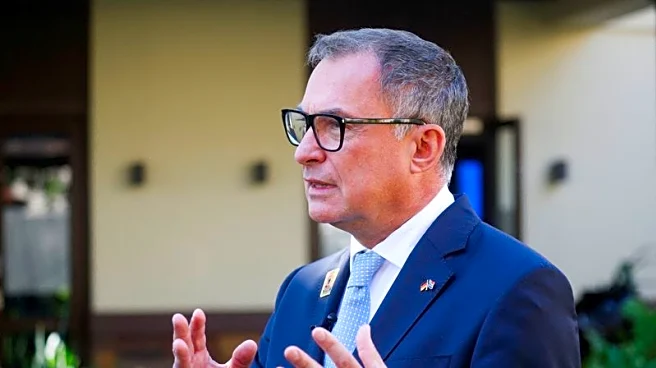What's Happening?
Mel Owens, the 66-year-old star of 'The Golden Bachelor,' addressed past ageist comments during the premiere of the show's second season. Owens had previously stated on a podcast that he preferred female contestants aged 45-60 and would 'cut' those over 60. These remarks were met with criticism, prompting Owens to apologize on the show. He expressed regret for his comments, stating that they do not reflect his true character. During the premiere, several contestants confronted Owens about his remarks, leading to a public apology where he asked for forgiveness and a chance to prove himself. The episode highlighted Owens' journey to find love, emphasizing that age does not matter in forming connections.
Why It's Important?
Owens' apology is significant as it addresses ageism, a prevalent issue in society, particularly in media and entertainment. By publicly acknowledging his mistake, Owens contributes to a broader conversation about stereotypes and biases against older individuals. This incident may influence public perceptions and encourage more inclusive attitudes towards aging. The show's focus on contestants over 60 challenges traditional norms and showcases the vitality and diversity of older adults, potentially impacting societal views on aging and representation in media.
What's Next?
As the season progresses, viewers will likely see how Owens' interactions with the contestants evolve following his apology. The show's narrative may continue to challenge age-related stereotypes, offering a platform for older individuals to share their stories and experiences. The reception of Owens' apology by the contestants and audience could shape future discussions on ageism in entertainment. Additionally, the show's success may encourage similar programs to feature older participants, promoting diversity and inclusivity in reality television.
Beyond the Headlines
Owens' comments and subsequent apology highlight the ethical considerations in reality TV casting and production. The incident underscores the importance of sensitivity and awareness in media portrayals of age and diversity. It also raises questions about the role of producers in guiding contestants' narratives and the impact of public scrutiny on personal growth. This development may lead to increased dialogue on ethical standards in entertainment and the responsibility of media figures to challenge harmful stereotypes.










